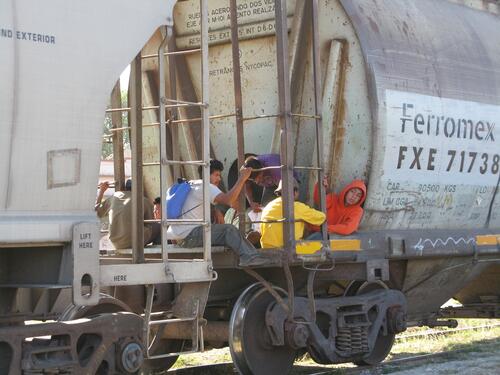91,000 people in a year. This is the transmigrant population estimated to cross Mexico by train.
91,000 stories of people who leave their homes in Central America to reach the United States. Most of them are forced to flee the violence in their countries of origin, and their journey through Mexico is not easy.
These are some of the testimonies MSF has registered. Testimonies of violations, abuses and problems accessing health services.
“I was given a lift in a Toyota van as we were told that they would help us cross the border with Mexico. There were 16 of us and a group of polleros (smugglers). We were attacked on the way in a place whose name I can’t remember. Polleros have contacts with train drivers, they give them up to $10,000 (around 700 US dollars) to allow migrants to get on board. We were put on a train by force. I think of it as an abduction, as I did not want to get on the train and later they demanded ransom for us. I was held captive for 16 days close to Tenosique.
We were given food but we were not allowed to use a toilet. They spoke with my brother-in-law as they forced us to give them our families’ phone numbers. They wanted 5,000 dollars for our release. Once the ransom was paid, they left us to fend for ourselves in Boca del Cerro without clothes and after beating us up. I spent one day there in the bush and I had to walk overnight to reach a village called Ejido Emiliano Zapata, where some people helped me and took me to the closest hospital. I lodged a complaint about the incident and went back to Guatemala. I returned a fortnight later and was given a humanitarian visa that has already expired. Now I am living in the streets.”
A 33-year-old patient from Honduras told our teams that she got on a train with her husband in Tierra Blanca. She saw some criminals get on the train but when she wanted to jump off, it was too late. These people took her away from her husband and one of them forced her to go with him on another train to Lechería, where she was held captive for two days in a house. Both in the train and in the house she was raped. Finally, she managed to escape and arrived to a shelter in Huehuetoca. But she still doesn’t know her husband’s whereabouts.
A 36 year-old patient is from Nicaragua explains that a group of criminals jumped into the train at night time around Veracruz. They assaulted and robbed them. “This is a kidnapping”, they told them, and started to undress them, hit them and take their belongings. Finally they left them naked and ran away.
“In Medias Aguas six police officers hit us. We had to go back to Ixtepec because I was feeling bad. We went to the hospital looking for health assistance but they didn't want to look for us as we were migrants. They told us we had to be accompanied by someone. My friend asked them to take care of me. I was lying on the floor for two hours wracked with pain and nobody took care of me. Finally, a woman who was in the waiting room angrily told the doctor: “Hey, this man is overwhelmed with pain, you are not going to assist him?" Finally they took care of me.
“A 32 year-old man from Salvador explains how three years ago, members of the gang called mara 13 came to his house to kill him. He doesn't exactly know why but he can think of two possible reasons: that he belonged to another organization or that he advised his neighbor that his cousin, who belongs to mara 13, had instructions to kill him. The day they came to kill him, he could run inside the house. But his 12 year-old sister, who was in the kitchen, was killed by a bullet.”



